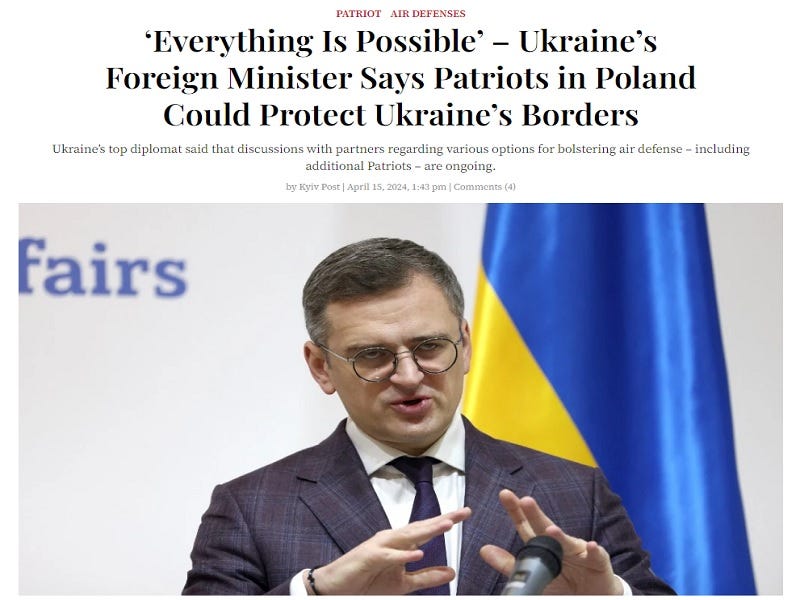The Anglo-American Axis recently signaled that it wouldn’t approve of this.
Ukrainian Foreign Minster Kuleba claimed that “Everything is possible” when recently asked about the scenario of Polish Patriot air defense systems being used to protect Western Ukraine. This shortly followed reports that Kiev was requesting these missiles from neighboring Poland and Romania, as well as faraway Spain, amidst Russia’s attacks against Ukraine’s energy grid. It would be surprising if Poland complied, however, since the Anglo-American Axis recently signaled that it wouldn’t approve of this.
British Foreign Secretary Cameron said in response to a question on Monday about why the UK won’t help Ukraine shoot down incoming Russian drones and missiles like it helped Israel shoot down incoming Iranian ones that “I think the difficulty with what you suggest is if you want to avoid an escalation in terms of a wider European war, I think the one thing you do need to avoid is NATO troops directly engaging Russian troops. That would be a danger of escalation.”
Pentagon spokesman Kirby said something similar on the same day: “I knew this question was coming. Look: different conflicts, different airspace, different threat picture. And [President Joe Biden] has been clear from the beginning [of the Ukraine hostilities] that the US is not going to be involved in that conflict in a combat role.” While it’s unlikely that either of them would hang Poland out to dry if it unilaterally shot down Russian projectiles over Ukraine, they’re clearly signaling that they don’t want it to do this.
Any such action could escalate the conflict beyond anyone’s control, which could at the very least destabilize the Western financial markets even if World War III doesn’t break out by miscalculation. That might in turn further reduce the odds of Biden winning re-election, thus explaining the political self-interest behind the US’ uncharacteristic restraint. Similar calculations account for why it speculatively coordinated with Iran behind the scenes during last week’s retributive strikes to prevent an escalation.
The American public has no appetite for their country’s direct involvement in a large-scale conflict after having already soured on its role in leading NATO’s proxy war on Russia in Ukraine. Furthermore, the destabilization of Western financial markets in the event of a NATO-Russian crisis brought about by one of the bloc’s members creating a “no-fly zone” over parts of Ukraine could push the US into a recession, thus unleashing more anti-incumbency sentiment that works against the ruling Democrats’ interests.
Nevertheless, just like Israel could exploit its role in catalyzing a large-scale conflict unless it obtains tangible concessions from the US, so too could Poland do the same. Unlike Israel, however, Poland doesn’t have the independent agency to pursue such a risky policy seeing as how its new liberal-globalist government comprehensively subordinated the country to Germany since mid-December. Whereas Israel is still sovereign despite claims of US control, Poland is a German puppet state nowadays.
Considering this, it would indeed be surprising if Polish Patriot systems were used to protect Western Ukraine, which Kuleba knows but still spoke ambiguously about the possibility in an attempt to pressure the West while keeping morale from plummeting even further at home. That’s not to say that this scenario can be ruled out, especially since the US could decide to escalate in response to a potential Russian military breakthrough, in which case they could cover the skies ahead of a Polish intervention.
For the time being, however, it’s very unlikely that the US would approve of Poland taking that step unless something seriously changes. Likewise, it’s even more unlikely that Poland would unilaterally do so in defiance of the Anglo-American Axis after it conveyed its disapproval of this possibility. For that reason, Kuleba’s proposal will probably amount to naught, with the only chance of it materializing absent a Russian breakthrough being if the US recklessly decides to “escalate to de-escalate”.




